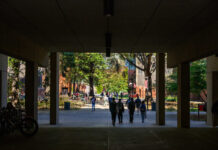
Researchers at the University of Louisville are working with Louisville/Jefferson County Metropolitan Sewer District to determine if areas of COVID-19 infection can be tracked by testing wastewater.
As part of community testing for Phase II of the Co-Immunity Project, MSD is providing samples from eight sites in its vast network of pipes and five treatment facilities which are sent weekly to UofL and research collaborators at Arizona State University for virus analysis.
The laboratory at ASU will use RT-PCR tests, a technique for detecting genetic material of the virus, to count copies of SARS-CoV-2 virus RNA in the wastewater and sewage sludge samples. The researchers believe the presence of this RNA sequence is an indicator of the level of infection with the virus in a given community.
To support this work and other aspects of the Co-Immunity Project, a groundbreaking collaboration to track and curb COVID-19, UofL has received a new $1 million gift from the Owsley Brown II Family Foundation.
“Traditionally, science has had difficulty addressing the interdependent nature of people and their environment or factoring in the many forms of human health, including environmental health and the water we all depend on. The Envirome Institute was founded to fill that void,” Christina Lee Brown said. “The challenges of this pandemic have made the need to learn how to make decisions through all forms of health all too clear, and I’m so proud the team here is at the national forefront of the response. The Co-Immunity Project, especially now with this singular partnership with MSD, puts Louisville and Kentucky at the cutting edge nationally in terms of virus monitoring.”
This research is part of the Co-Immunity Project’s Phase II, announced last week, which also includes testing 2,400 individuals for SARS-CoV-2 infection and antibodies. By concurrently testing individuals and wastewater from different parts of Jefferson County, the researchers hope to develop a “virus radar” to track the spread of the virus in the county. The “virus radar” could be used to identify hot spots of viral infections and even as an early warning sign of future outbreaks in an area. This information could be used to guide public health actions and social restrictions to reduce future surges.
“MSD has a team of skilled professionals who are already taking samples as part of our operations and regulatory requirements. It was a natural extension to offer help to the researchers at the University of Louisville for this important COVID-19 research,” said MSD Executive Director Tony Parrott.
MSD wastewater operators and lab staff already have personal protective equipment and follow best practice guidelines from the Occupational Safety and Health Administration and the Centers for Disease Control and Prevention in their daily work. These measures also protect the safety of MSD employees who obtain the samples for this research.
The Water Environment Federation reports that to date, there have been no cases in the U.S. or elsewhere in the developed world of infection of a wastewater employee with the COVID-19 virus as a result of treatment operations.
UofL has offered additional MSD employee testing as part of this research collaboration. MSD employee time for supporting this project is funded by the Co-Immunity Project. The project is part of Metro Louisville’s COVID-19 testing framework that includes extensive testing and contact tracing to contain COVID-19 in the city.
“This collaboration builds off years of research partnership with MSD and our collaborators at Arizona State University,” said Ted Smith, director of the Center for Healthy Air, Water and Soil in the UofL Christina Lee Brown Envirome Institute. “We hope to learn quickly how coronavirus detection in our wastewater can be a useful input to Louisville’s overall COVID-19 test and containment effort.”
This type of testing has been demonstrated to be a reliable indicator of infection in entire communities. Recently, Yale University published research showing that the amount of virus in daily samples taken between March 19 and May 1 was a seven-day leading indicator of positive clinical tests for COVID-19 in the New Haven, Connecticut, population of 200,000.
“We are incredibly grateful to the Owsley Brown II Family Foundation for funding the important work of the Co-Immunity Project,” said Aruni Bhatnagar, director of the UofL Envirome Institute. “This research, combined with the other components of the project, may provide new ways of understanding this emerging area of epidemiology and guide Louisville and other communities in responding effectively to COVID-19, and perhaps other infectious diseases as well.”
The Co-Immunity Project is a collaboration of the UofL Christina Lee Brown Envirome Institute, the Louisville Healthcare CEO Council and three health systems in Louisville – Baptist Health, Norton Healthcare and UofL Health.































